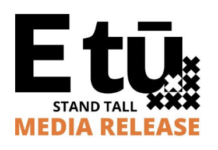NZEI Te Riu Roa are welcoming a pre-Budget announcement today that commits a further $170m toward increasing pay in the sector.
Currently, ECE teachers earn as much as $17,000 per year less than their kindergarten peers with the same qualifications and equivalent work.
“Today’s announcement is a significant step towards pay parity”, says the union’s National Executive representative for early childhood education, Virginia Oakly.
“Pay parity is an essential pre-condition to valuing all teachers for the work they do. Most employers want to pay teachers their worth and now they can. But there is still more progress to be made.
“Funding the first six steps on the kindergarten pay scale for employers that opt in to do this is good, but pay parity is for everyone.
“Ultimately, we need to centralise payment of teachers rather than bulk fund services. This will remove the incentive for employers to pay teachers less to maximise profit and give the public reassurances that money is going straight to teachers’ pay packets. Until that happens, collective agreements are the best way to ensure that funding increases designed to lift teacher salaries go directly to teachers.
“The Minister also announced today that he is looking to redesign the current broken funding model. We’ve been calling for this for a long time, and we look forward to assisting him in this piece of work.
“Today is a win for the ECE sector, which has been overlooked for so long, but most of all it is a win for our tamariki who are the future of Aotearoa”.
Early childhood education announcements today
- From 1 July 2021, an increase in the minimum pay (attestation) rate for qualified ECE teachers from $49,862 up to $51,358
- From 1 January 2022, additional funding for centres that commit to paying their staff in line with the first six steps of the Kindergarten Teachers Collective Agreement
- Pay improvements for Kōhanga Reo, to be implemented in collaboration with Te Kōhanga Reo National Trust





